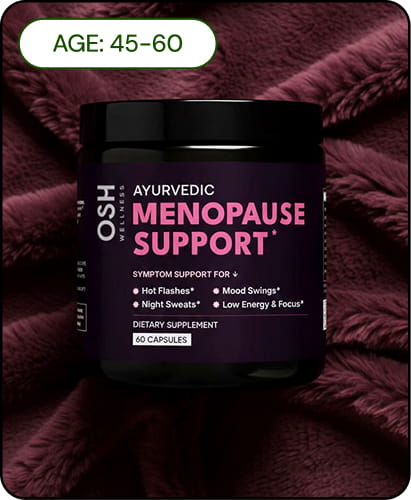Table of contents
Menopause is a significant transitional phase in a woman's life, often accompanied by weight gain due to hormonal imbalances. Ayurveda, with its holistic view of health, provides valuable tools for navigating these changes. By integrating natural detox practices, dietary adjustments, and lifestyle modifications, women can effectively manage their weight and promote emotional balance during this critical period. This article delves into Ayurvedic perspectives on menopause, offering insights, practical tips, and detailed recommendations to empower women in their journey through this life stage.
Understanding Menopause and Ayurveda

Ayurveda offers a holistic framework for understanding and navigating menopause, addressing the complexities that arise during this significant transition. Menopause marks the end of a woman’s reproductive years, linked to declining levels of estrogen and progesterone. These hormonal shifts can trigger various physical and emotional symptoms, including hot flashes, mood swings, sleep disorders, and, of course, weight gain. Lifestyle factors like stress and poor diet can compound these issues, making robust self-care essential.
Central to Ayurveda’s philosophy is the concept of the three doshas, Vata, Pitta, and Kapha, which represent different bodily energies. Menopausal weight gain is often attributed to a dosha imbalance. An aggravated Kapha dosha, for instance, is associated with fluid retention and sluggish metabolism. Ayurvedic practitioners assess doshic imbalances to recommend personalized lifestyle and dietary plans that align with one's constitution [1].
Digestive health (Agni) is another cornerstone in Ayurvedic care. As metabolism may decline by up to 20% during menopause, Ayurvedic wisdom suggests consuming the heaviest meal at midday and reducing total calorie intake by about 20% to align with lowered digestive capacity [2]. Detox therapies like Panchakarma can help eliminate accumulated toxins, improving metabolism and alleviating menopausal symptoms like bloating and weight gain [3].
Incorporating yoga and mindful movement is also instrumental. These practices foster emotional well-being and help regulate weight, critical during menopause [4].
Ultimately, Ayurveda offers a timeless, individualized system for balancing the body and mind during menopause, empowering women to manage both their weight and health wisely and naturally.
Hormonal Changes and Weight Management

Menopause brings profound hormonal fluctuations. Estrogen, essential for regulating metabolism, begins to decline, leading to increased visceral fat, especially around the abdomen. This shift contributes to diminished lean muscle mass and a slower metabolic rate up to 20% in some women [5].
These physiological changes are often accompanied by emotional shifts, including irritability and anxiety, contributing to overeating and poor dietary choices. Ayurveda addresses this interplay by reinforcing an individualized, dosha-specific approach [1].
Key recommendations include:
Consuming the main meal at lunch when the digestive fire (Agni) is strongest
Incorporating herbal support and mild detoxification strategies such as Panchakarma
Utilizing calming practices like yoga and pranayama for emotional balance [6]
These holistic strategies ensure that weight management is approached ethically, gently, and effectively.
Daily Detox Practices

Daily detox rituals form a critical component in Ayurveda’s approach to managing menopausal transitions. While Panchakarma is the pinnacle of detox therapies, it may not be accessible to everyone. Fortunately, daily routines can yield substantial benefits.
Recommended everyday toxins-clearing habits include:
Warm lemon water in the morning to stimulate digestion and hydration
CCF tea (cumin, coriander, and fennel) to support gentle cleansing, reduce bloating, and balance heat levels [7]
These thoughtfully selected herbs and rituals enhance digestion, support liver function, and align with natural circadian rhythms, making them ideal for those experiencing menopausal symptoms [1].
Ayurvedic Dietary Guidelines

During menopause, Ayurvedic texts often describe the body entering a Vata-dominant phase , bringing with it symptoms such as dryness, anxiety, and irregular digestion. A Vata-pacifying diet, therefore, becomes essential.
This dietary pattern includes:
Warm, cooked meals like soups, dals, and porridges
Generous use of healthy fats such as ghee and olive oil, especially cow's desi ghee [8]
Digestive spices: cumin, ginger, turmeric [1]
Regular meal times with smaller portions
Limiting raw, cold, or highly processed foods as well as alcohol and caffeine [9]
By sticking to these principles, women can nourish themselves while counteracting common side effects like digestive discomfort, mood swings, and weight fluctuations during menopause.
Integrating Mind-Body Practices

Mind-body practices such as yoga and pranayama can have a transformative effect on menopausal symptoms. A randomized clinical trial showed significant reductions in hot flashes, sleep problems, and anxiety following a 10-week yoga regimen [10].
Key physical and emotional benefits include:
Improved flexibility, posture, and muscle strength
Enhanced mood regulation and cognitive clarity [11]
Better sleep and reduced stress levels
Recommended yoga poses for menopause include Balasana (Child’s Pose) for grounding, Viparita Karani (Legs-Up-The-Wall) to ease fatigue, and Vrikshasana (Tree Pose) for stable focus. Pranayama techniques like Nadi Shodhana (Alternate Nostril Breathing) offer additional relaxation support [12] .
Herbal Support for Menopause

Ayurveda relies on plant-based remedies to gently balance hormones and aid weight regulation. Key herbs include:
Shatavari (Asparagus racemosus): Eases hot flashes and mood swings while enhancing reproductive health [1]
Ashwagandha (Withania somnifera): Reduces cortisol and stress levels, supporting metabolic and emotional balance [13]
Triphala: Supports liver detoxification and digestion, both crucial for hormone regulation [14]
Cyperus rotundus (Musta): Relieves night sweats and supports hormonal homeostasis [15]
While effective, these herbs must be prescribed or supervised by a qualified Ayurvedic practitioner to avoid contraindications based on existing health conditions.
Relevant Products
Explore Osh Wellness Hormone & Mood Support , a supplement grounded in Ayurvedic principles. It offers a blend of natural ingredients that promote hormonal balance, manage menopausal weight gain, and support emotional stability. As part of a broader wellness plan, it complements both dietary and lifestyle changes tailored for midlife health.
Conclusions

Ayurveda empowers women with a comprehensive, natural solution for managing menopause, focusing on balance, nourishment, and mindfulness. From dietary shifts and detox practices to therapeutic herbs and yoga, Ayurveda provides the tools to manage the physical and emotional changes of menopause effectively. This holistic approach to menopause not only addresses symptoms but also fosters deeper awareness and resilience, allowing women to reclaim vitality during one of life’s most transformative stages.
FAQs
How can Ayurveda help with menopausal symptoms?
Ayurveda offers natural remedies and lifestyle practices to balance hormones and alleviate symptoms such as hot flashes, insomnia, and mood swings.
Are there specific diets in Ayurveda for menopause weight gain?
Yes. Ayurveda suggests Vata-balancing diets with warm, cooked foods and specific spices to enhance digestion and metabolism.
What are the risks of following Ayurvedic detox methods?
While generally safe when personalized, detox regimens should always be supervised by a practitioner to ensure suitability for your health profile.
How long does it take to see results from Ayurvedic practices?
Many people report improvements within 2–4 weeks of consistent practice, though timelines can vary by individual.
Can I combine Ayurvedic practices with conventional medicine?
Yes. Ayurveda can complement conventional care, but always inform your healthcare provider about any new therapies or supplements.
Sources
1: Banyan Botanicals - Ayurvedic Menopause Guide
2: Yatan Ayur - Treat Menopause Symptoms of Weight Gain with Ayurveda
3: Shathayu Retreat - Ayurvedic Treatment for Menopause
4: Art of Living - Menopause, Belly Fat and Other Issues
5: Svastha Ayurveda - Ask Ayurveda: Menopausal Weight Gain
6: Healthline - Ayurvedic Detox
7: Nirva Health - Ayurvedic Diet for Menopause
8: Amrtasiddhi - Ayurvedic Guide to Menopause
9: Dr. Sharda Ayurveda - Foods for Menopause Management
10: International Menopause Society - Yoga on Menopausal Symptoms
11: International Journal of Nursing Practice - Effectiveness of Yoga for Menopausal Symptoms
12: YogaU Online - Yoga for Menopause
13: LifeSpa - Best Ayurvedic Herbs for Menopause
14: The Ayurvedic Clinic - Hormonal Harmony Practices
15: Ayuvya - Medicine for Hormonal Imbalance







